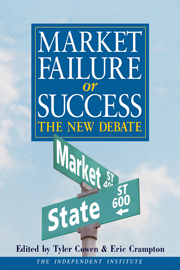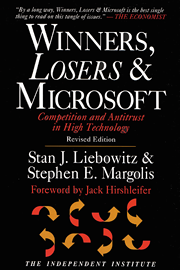The AOL Time Warner merger has generated outpourings of animated commentary, with stock market junkies transfixed by the question of what new marriage between Internet and media giants will be next. At the same time, the news media are reporting that the Justice Department and States have concluded that Microsoft needs to be broken up into several ‘Baby Bills’. What an odd juxtaposition of events. Surely, even Judge Jackson, if he should find the occasion to reflect upon his Findings of Fact, must get the feeling that they deal with events that occurred a long time ago in a galaxy far, far away.
Without attempting to answer the general question about whether antitrust is simply out of date in the fast paced world of the Internet, it seems readily apparent that the Microsoft antitrust action is out of date. This is so even though the judge moved the proceedings along at what can only be considered breakneck speed for an antitrust action of this magnitude. Judge Jackson has taken the amazing step of limiting the number of witnesses on both sides to 12 and skipping all oral testimony except for cross-examinations. Keeping his foot on the throttle, he provided little time for both sides to present their written evidence and he produced his Finding of Facts quickly.
Nevertheless, the market has been completely transformed since the trial began. The trial focused on the computer desktop, which the market is treating with rather quaint disregard these days. Instead, there is a mad rush to stake out positions in the melding of entertainment, news, commerce, and information on the Internet.
It is now clear that the major combatants in these markets will be large and well financed. In addition to AOL Time Warner, whose revenues surpass those of Microsoft, the players include AT&T, Disney, News Corp, Sony, and other companies whose revenues either outstrip Microsoft’s or are in a similar league.
Success in the Internet market battles is thought to require the provision of broadband Internet access and proprietary content. Ownership of cable systems, which provide broadband access, is considerably more important than ownership of the initial Windows desktop, for the simple reason that any consumer can put any program on their desktop at any time, but they have no ability to alter the offerings of their cable operators. Nevertheless, judge Jackson concluded that control of the initial desktop configuration was the key to immense market power.
Microsoft, too, is focused on the forthcoming battle, having made the Internet its number one priority in the mid 1990s. One of its first activities in that direction was the creation of its browser. At that time Netscape was the reigning champion of the Internet due to its wildly popular Netscape Navigator browser, a position that Microsoft coveted. Microsoft’s successful breaking of Netscape’s stranglehold on the browser market formed the basis of the current case.
Microsoft’s other Internet stratagems have to date proven less successful—the Microsoft Network, buying content providers, trying to put a midget version of Windows into set-top boxes and Internet appliances, investing in cable systems, and so forth—but they demonstrates Microsoft’s intent.
Yet, Judge Jackson gave no credence to the possibility that Microsoft’s was focused on the Internet market. Instead, he concluded that the Netscape browser was a potential operating system and that Microsoft’s creation of its browser was intended to thwart this threat to Windows. He concluded that there were no viable alternatives to Windows, that Linux was irrelevant, and so too were Internet appliances.
The events that have occurred outside of his courtroom invalidate his conclusion and make the central issues of the case almost irrelevant. The run up in Red Hat’s stock, the attention being generated by Internet appliances, and the incredible valuations being place on any company with a dot com in its name all demonstrate that the Judge’s conclusions are wrong.
But demonstrable facts seem unlikely to influence the results of this trial. When AOL purchased Netscape, which in a single stroke could once again have given Netscape an overwhelming market share, the judge found it irrelevant.
Instead he agreed with claims first put forward by companies trying to manipulate antitrust for their own ends. One of those companies was Netscape, which is now a part of AOL Time Warner. AOL has a history of successfully manipulating government for its own advantage, including instigating a Department of Justice investigation of the Microsoft Network even though AOL held a dominant market share. Just as history has shown that Microsoft did not have the power to force consumers to subscribe to Microsoft Network, it has also shown that Netscape’s browser was not an alternative operating system.
Now we are told that the remedy the government seeks is to shrink Microsoft at a time when the other players in the market are supersizing. A breakup is often a crippling blow, sewing chaos and confusion within the new component companies for a significant period of time. Although it is technically true that the number of firms would be increased by a Microsoft breakup, the number of viable competitors in this market would be reduced. Some or all of the Baby Bills might then feel the need to merge with one of the above mentioned giants in an attempt to remain competitive. Perhaps we will be treated to the sight of AOL Time Warner coming to own Windows! Where is the gain for consumers?
But alas, concern for consumers has not been the focus of this case. The judge virtually ignored consumer welfare in his ruling, and it played virtually no role in the government’s case. Even if one believes the government’s charge that Microsoft bullied other firms, the evidence is clear that Microsoft’s low prices, and there is ample evidence that they have lowered prices, have been good for consumers.
Consumers would be well served in the upcoming battle for the Internet if they have more choice, not less. If the government does decide on some sort of breakup at this crucial moment, consumers are likely to be deprived of an important option. Antitrust will have been used, as it has before, to promote the interests of the few at the expense of the many.










